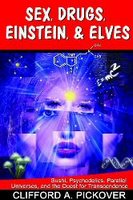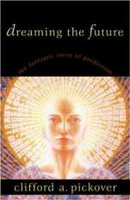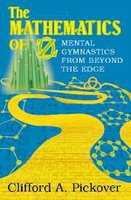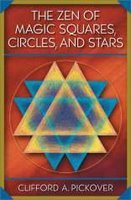Saturday, April 29, 2006
Bible says that there is no afterlife
Ecclesiastes 9:5 precludes an afterlife: "For the living know that they shall die: but the dead know not any thing, neither have they any more a reward; for the memory of them is forgotten." Another translation: "For the living know that they shall die: but the dead are not conscious, neither have they any more a reward; for the memory of them is forgotten."
Comments:
<< Home
This is interesting, I also believe this. As far as I am aware only a handle of denominations do not teach the "immortality of the soul". Where, then, did this belief originate?
The bible seems to be fairly conflicted on this point according to the Skeptics Annotated Bible. Since most of the points against are in the New Testament, I am a little surprised that most Jewish faiths also beleive in an afterlife of some sort.
I believe the idea of an after life, heaven and hell, was a creation by the Christian, priestly elite, in an effort to control the behavior of the masses.
A lie told over and over and believed, is still a lie.
A lie told over and over and believed, is still a lie.
A text without a context is a pretext. Ecclesiastes as a whole speaks to the futility of life as a thing in itself, absent God. Each chapter adds evidence for this position. Chapter 9 does its part to support the theme by noting that both the righteous and the wicked die. The same fate befalls them both. Yet, "... he who is joined with the living has hope. (9.4)" The point is to turn to God now before it is too late. The book concludes by warning that "God will bring every deed into judgement... whether good or evil. (12.14)" So clearly, the author is quite convinced of life after death.
In contrast to the position of some of your commenters, life after death is a very ancient Biblical concept that predates even the establishment of the Hebrew nation. The book of Job, generally regarded as the oldest book in the Bible, states "I know that my Redeemer lives... and after my skin has been destroyed, yet in my flesh I shall see God (19.25)." Even Moses was told by God "I am the God of Abraham, Issac, and Jacob." Christ uses this as a proof text of life after death by making the point that God does not say "I was..." but "I am..." This can be so only if the patriarchs are alive and in God's continued company (Matthew 22.32). In short, Ecclesiasties 9.5, when read in context, supports life after death.
In contrast to the position of some of your commenters, life after death is a very ancient Biblical concept that predates even the establishment of the Hebrew nation. The book of Job, generally regarded as the oldest book in the Bible, states "I know that my Redeemer lives... and after my skin has been destroyed, yet in my flesh I shall see God (19.25)." Even Moses was told by God "I am the God of Abraham, Issac, and Jacob." Christ uses this as a proof text of life after death by making the point that God does not say "I was..." but "I am..." This can be so only if the patriarchs are alive and in God's continued company (Matthew 22.32). In short, Ecclesiasties 9.5, when read in context, supports life after death.
True, the author of Ecclesiastes "the Preacher" answered the question of whether there was life after death with a great big, “Who knows?” (Eccles. 3:21)
As for righteousness, his advice was, “Be not righteous overmuch.” (Eccles. 7:16)
And his advice concerning the best pursuit in life was, “A man hath no better thing under the sun, than to eat, and to drink, and to be merry.” (Eccles. 8:15)
Wow, and that's in an "inerrant" Bible?
Of course such teachings are exlained away as by "inerrantist Bible believers" as merely preserving the author's own questionable views, yet "inerrantly preserved" for us to see, not views whose conclusions are inspired inerrantly by "God."
Neat how that "inerrancy" thing works, ain't it? Once you believe a holy book is inerrant it can say completely different things and you can still make excuses for parts of the book the don't jive with one other. The above excuse is a cutie, but the "progressive revelation" one is another cutie.
One person who was raised in that milieu, recalls:
They devised an elaborate system of mental watertight compartments. The contradictions of Old and New Testaments were solved by a Doctrine that what was sauce for the Jewish "Dispensation" was not necessarily sauce for the Christian "Dispensation." Cleverer than Luther, they made possible the Epistle of James [and it's message about works being more important than faith] by a series of sophisms which really deserve to be exposed as masterpieces of human self-deception. My space forbids.
So, despite all the simplicity of the original logical position [i.e., that the "Word of God" must be without error or contradiction], they were found shifting as best they might from compromise to compromise. But this they never saw themselves; and so far did they take their principle that my father would refuse to buy railway shares because railways were not mentioned in the Bible! Of course the practice of finding a text for everything means ultimately "I will do as I like," and I suspect my father's heroics only meant that he thought a slump was coming.
Sadly, if the above person's father had just searched his Bible a little more and with a bit more faith (and creativity) he could have found "railways" mentioned in the Bible! Chaplain Tresham Dames Gregg did, and delivered a noteworthy sermon on the subject that was published as a booklet in 1863, "The Steam Locomotive as Revealed in the Bible. A Lecture Delivered to Young Men in Sheffield."
Chaplain Gregg's sermon is a little gem of fundamentalist ingenuity and creativity in which he demonstrates that God gave the prophet Ezekiel a vision of a steam locomotive. (Ezek. 1:4-25)
So an inerrantist Bible believer not only believes that "with God, all things are possible," but, "with the Bible, all interpretations are possible" (except, of course, any that disagree with church doctrine, or imply the existence of errors or contradictions).
Bravo!
------------
Also, the belief that everyone would one day be “raised” or “resurrected” from the dead appeared late in the history of Judaism, and was most likely borrowed from the ancient Persian religion, Zoroastrianism. In fact such a belief only began to appear in Apocalypses written just two to three hundred years before the advent of Christianity. Even in Jesus’s day the Jewish group known as the Sadducees continued to argue that there was no Scriptural warrant for switching from the old Jewish idea of death as the end of life to the then “modern” idea of a general resurrection of the dead.
As N.T. theologian Marxsen pointed out, "Anyone who was an orthodox Jewish believer, who was determined to adhere to 'the faith of our fathers,' who did not want to relinquish the Old Testament and desired 'no other gospel' (and this was all true of the Sadducees) was bound to reject this teaching of 'modern theology.' One did not want to fall victim to 'modernism!' But the Sadducees could not hold back the tide. Expectation of the resurrection of the dead had become general among the Jews by their day. [Willi Marxsen, The Resurrection of Jesus of Nazareth]
Or as Jonathan Swift once put it, as cited by Voltaire:
Is it possible that God explained to the Jews the way they must go to the bathroom in the wilderness (Deut. 23), yet hid from them the dogma of a future life? Jonathan Swift said that according to God’s laws revealed to Moses, God had taken more care of the Jews’ hinder parts than he did of their souls. [Voltaire, The Important Examination of the Holy Scriptures]
Cheers, All!
Edward T. Babinski
As for righteousness, his advice was, “Be not righteous overmuch.” (Eccles. 7:16)
And his advice concerning the best pursuit in life was, “A man hath no better thing under the sun, than to eat, and to drink, and to be merry.” (Eccles. 8:15)
Wow, and that's in an "inerrant" Bible?
Of course such teachings are exlained away as by "inerrantist Bible believers" as merely preserving the author's own questionable views, yet "inerrantly preserved" for us to see, not views whose conclusions are inspired inerrantly by "God."
Neat how that "inerrancy" thing works, ain't it? Once you believe a holy book is inerrant it can say completely different things and you can still make excuses for parts of the book the don't jive with one other. The above excuse is a cutie, but the "progressive revelation" one is another cutie.
One person who was raised in that milieu, recalls:
They devised an elaborate system of mental watertight compartments. The contradictions of Old and New Testaments were solved by a Doctrine that what was sauce for the Jewish "Dispensation" was not necessarily sauce for the Christian "Dispensation." Cleverer than Luther, they made possible the Epistle of James [and it's message about works being more important than faith] by a series of sophisms which really deserve to be exposed as masterpieces of human self-deception. My space forbids.
So, despite all the simplicity of the original logical position [i.e., that the "Word of God" must be without error or contradiction], they were found shifting as best they might from compromise to compromise. But this they never saw themselves; and so far did they take their principle that my father would refuse to buy railway shares because railways were not mentioned in the Bible! Of course the practice of finding a text for everything means ultimately "I will do as I like," and I suspect my father's heroics only meant that he thought a slump was coming.
Sadly, if the above person's father had just searched his Bible a little more and with a bit more faith (and creativity) he could have found "railways" mentioned in the Bible! Chaplain Tresham Dames Gregg did, and delivered a noteworthy sermon on the subject that was published as a booklet in 1863, "The Steam Locomotive as Revealed in the Bible. A Lecture Delivered to Young Men in Sheffield."
Chaplain Gregg's sermon is a little gem of fundamentalist ingenuity and creativity in which he demonstrates that God gave the prophet Ezekiel a vision of a steam locomotive. (Ezek. 1:4-25)
So an inerrantist Bible believer not only believes that "with God, all things are possible," but, "with the Bible, all interpretations are possible" (except, of course, any that disagree with church doctrine, or imply the existence of errors or contradictions).
Bravo!
------------
Also, the belief that everyone would one day be “raised” or “resurrected” from the dead appeared late in the history of Judaism, and was most likely borrowed from the ancient Persian religion, Zoroastrianism. In fact such a belief only began to appear in Apocalypses written just two to three hundred years before the advent of Christianity. Even in Jesus’s day the Jewish group known as the Sadducees continued to argue that there was no Scriptural warrant for switching from the old Jewish idea of death as the end of life to the then “modern” idea of a general resurrection of the dead.
As N.T. theologian Marxsen pointed out, "Anyone who was an orthodox Jewish believer, who was determined to adhere to 'the faith of our fathers,' who did not want to relinquish the Old Testament and desired 'no other gospel' (and this was all true of the Sadducees) was bound to reject this teaching of 'modern theology.' One did not want to fall victim to 'modernism!' But the Sadducees could not hold back the tide. Expectation of the resurrection of the dead had become general among the Jews by their day. [Willi Marxsen, The Resurrection of Jesus of Nazareth]
Or as Jonathan Swift once put it, as cited by Voltaire:
Is it possible that God explained to the Jews the way they must go to the bathroom in the wilderness (Deut. 23), yet hid from them the dogma of a future life? Jonathan Swift said that according to God’s laws revealed to Moses, God had taken more care of the Jews’ hinder parts than he did of their souls. [Voltaire, The Important Examination of the Holy Scriptures]
Cheers, All!
Edward T. Babinski
Well thats an end to the reason that anyone is really a christian isn't it? (Apart from aggravating non-christians that is). Time to find something constructive to do with your life instead. lol!
The idea of an afterlfe is common to almost all cultures, advanced or primative, and occurs in the most ancient literature as well. It seems that only very sophisticated modern intellectuals don't believe it.
Your comment about Ecclesiastes saying there is no afterlife is mistaken. The book of Ecclesiastes
is written about "the man under the sun" unique only to this one book. The "man under the sun" is a meaning which implies "the flesh man on the earth" only.This book of wisdom is intended to deal with "flesh man" living under the sun. Naturally when you die in this flesh body you no longer "know anything" according to this flesh world as you are gone from the flesh body and are no longer here. This is not mysterious, it is very simple to understand if you have understanding of what this book is meant to describe. To follow your "logic" in the thinking you ascribe here to this book, how then do you explain Ecclesiastes 12:7 that says after you die your body goes back to dust and then the "spirit" goes back to God who gave it.This of course is not a contradiction at all if one understands how to apply the correct understanding of why Ecclesiastes was written and to "who" to start with.This is a common mistake made by many people when reading the scriptures.Every book has a specific audience it addresses for specific reasons.
is written about "the man under the sun" unique only to this one book. The "man under the sun" is a meaning which implies "the flesh man on the earth" only.This book of wisdom is intended to deal with "flesh man" living under the sun. Naturally when you die in this flesh body you no longer "know anything" according to this flesh world as you are gone from the flesh body and are no longer here. This is not mysterious, it is very simple to understand if you have understanding of what this book is meant to describe. To follow your "logic" in the thinking you ascribe here to this book, how then do you explain Ecclesiastes 12:7 that says after you die your body goes back to dust and then the "spirit" goes back to God who gave it.This of course is not a contradiction at all if one understands how to apply the correct understanding of why Ecclesiastes was written and to "who" to start with.This is a common mistake made by many people when reading the scriptures.Every book has a specific audience it addresses for specific reasons.
Eccles 12:5 "...Then man goes to his eternal home and mourners go about the streets." Most jewish faiths probably believe in eternal life b/c many instances in other old testament books refer a eternal life, such as in Isaiah where God swallows up death and rewards the good people, and later in the book of Isaiah it states that the unrighteous are dead and live no more, their departed spirits do not rise, but the righteious dead will live, their bodies will rise and the those who dwell in the earth wake up and shout for joy. Psalms and proverbs also have similar passages referring to the wicked dying, but for the righteous, it is only temporary.
Good catch, Cliff. A lot of people would be shocked to know exactly what the Bible does - and does not - exactly say.
After life possibility.
(Ecl 9:5).Eclessiastes was written by the King solomon. He very well could have been a Sadducee.
Sadducees rejected the existence of an afterlife,angels,spirits.ect.
Death to him would be just that.(However pharisees did believe in a after life.)After all jesus and christianity with all its promises of heavens reward had not happened yet.Thats sadyousee.
(Ecl 9:5).Eclessiastes was written by the King solomon. He very well could have been a Sadducee.
Sadducees rejected the existence of an afterlife,angels,spirits.ect.
Death to him would be just that.(However pharisees did believe in a after life.)After all jesus and christianity with all its promises of heavens reward had not happened yet.Thats sadyousee.
Extensive study of different bible versions, with the use of common sense bring up the following points which to me, simply underline the realistic sense it makes that God, Jahweh or Jehovah, as depicted in the bible, never intended to communicate the sense of the afterlife to his humans.
He said to Adam; "..the day you eat from it you will positively die"
Yet recall, who was it that said to Eve, ".. you will positively not die"?
Satan.
For centuries, and millenniums this crafty individual has been out to make people believe that God lied to us, that death is not the end, making us brazenly believe we are absolutely capable of cheating death, thus also evading "the wages sin pays is death."
Bible also explains that God's purpose for mankind was to "fill the earth and become many."
He created us in his likeness, man at first was never meant to die, hate, kill and do the things we do today. Suffering was not part of God's plan, although he did set up his judicial law that whomever decided to disobey and thus violate His right to sovereignty would inevitably, no exceptions to be made, receive the full decree, in this case he warned Adam in advance that it would be death.
In turn this decay would also cause disease and then suffering was introduced into the human race. This deficit was then genetically handed down from man to man born in sin.
Yet, why are we inclined to do bad? Recall what it was that Adam was not supposed to eat?
The fruit of knowledge of good and bad.
The bible explains simply that Adam and Eve were innocent, and knew no bad. Once introduced the ability to know good and bad, combined with the inexperience of the human, with the rebellious attitude introduced by Satan, you have a whole race of men whose "inclination is to do bad all the time."
See God had this gift reserved to present it to us for use, upon His grant, when they would have been morally mature. Humans just failed to rely on God.
All the confusions and so called biblical controversies are simply fruits of our inclination to refuse to believe that we indeed deserve, through our sinfulness, the full condemnation to Death. And our very creative minds, along with the help of Satanic influences around us, say movies, books, folklore, and other practices, also add to our denying the simplicity of death, when you die you are unconscious. It's simply to calm our fear of death, we are afraid of it's terminality, we want it not to be the end, and indeed it can prove to be just a temporary state for those who truly rely on God.
You just cease to function and also exist. After that only God has the power to remember you and materialize you once again to full functionality. Just like you always remember your beloved dead, in like manner God will remember those who were is true servants and as Jesus said "Those in the memorial tombs will hear his voice and come to life again."
The bible is very much a real book, with real answers to these important questions, many people will object to the delving into these subjects because they either lack interest or are tired of this bad world.
Yet, God will bring eternal blessings....
And I know what I sound like and yes that is the case...
To learn more look for the book "What the bible REALLY teaches", published by the JW's. Supported much of my already extensive search.
Our world isn't as scary as we'd like to portray it.
He said to Adam; "..the day you eat from it you will positively die"
Yet recall, who was it that said to Eve, ".. you will positively not die"?
Satan.
For centuries, and millenniums this crafty individual has been out to make people believe that God lied to us, that death is not the end, making us brazenly believe we are absolutely capable of cheating death, thus also evading "the wages sin pays is death."
Bible also explains that God's purpose for mankind was to "fill the earth and become many."
He created us in his likeness, man at first was never meant to die, hate, kill and do the things we do today. Suffering was not part of God's plan, although he did set up his judicial law that whomever decided to disobey and thus violate His right to sovereignty would inevitably, no exceptions to be made, receive the full decree, in this case he warned Adam in advance that it would be death.
In turn this decay would also cause disease and then suffering was introduced into the human race. This deficit was then genetically handed down from man to man born in sin.
Yet, why are we inclined to do bad? Recall what it was that Adam was not supposed to eat?
The fruit of knowledge of good and bad.
The bible explains simply that Adam and Eve were innocent, and knew no bad. Once introduced the ability to know good and bad, combined with the inexperience of the human, with the rebellious attitude introduced by Satan, you have a whole race of men whose "inclination is to do bad all the time."
See God had this gift reserved to present it to us for use, upon His grant, when they would have been morally mature. Humans just failed to rely on God.
All the confusions and so called biblical controversies are simply fruits of our inclination to refuse to believe that we indeed deserve, through our sinfulness, the full condemnation to Death. And our very creative minds, along with the help of Satanic influences around us, say movies, books, folklore, and other practices, also add to our denying the simplicity of death, when you die you are unconscious. It's simply to calm our fear of death, we are afraid of it's terminality, we want it not to be the end, and indeed it can prove to be just a temporary state for those who truly rely on God.
You just cease to function and also exist. After that only God has the power to remember you and materialize you once again to full functionality. Just like you always remember your beloved dead, in like manner God will remember those who were is true servants and as Jesus said "Those in the memorial tombs will hear his voice and come to life again."
The bible is very much a real book, with real answers to these important questions, many people will object to the delving into these subjects because they either lack interest or are tired of this bad world.
Yet, God will bring eternal blessings....
And I know what I sound like and yes that is the case...
To learn more look for the book "What the bible REALLY teaches", published by the JW's. Supported much of my already extensive search.
Our world isn't as scary as we'd like to portray it.
in the bible does it explaine the existes of caveman. or dinosaurs for we all know they existed.? besides the bible is so full of contradictions. it promotes slavery,sexismand discrimination. one part of the bible it says money is the root of all evil but in ecc it says money is the answer to all things. the bible is nothing more than a book of morals.
comment from johnny lynn gardner
sunday may 18 2008
that says when you forget your memory then you are dead and that is a lie and so it is an OCCULT :
johnnylynngardner@gmail.com
sunday may 18 2008
that says when you forget your memory then you are dead and that is a lie and so it is an OCCULT :
johnnylynngardner@gmail.com
Great Subject. It is really nice to find a post where people are able to express their beliefs without being insulted. Long Live The "Moderator"
C'mon people, when are you going to get past this? Any mature, reasonable adult has dismissed this superstitious nonsense about there being a 'god'or santa clause, tooth fairy or ghosts long ago. Some of us just need to grow up.......that's all.
Post a Comment
<< Home
 Godlorica
Godlorica



























